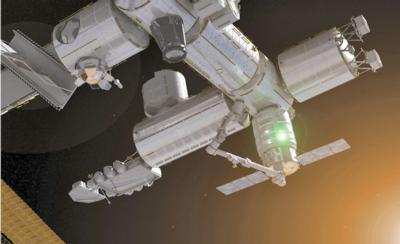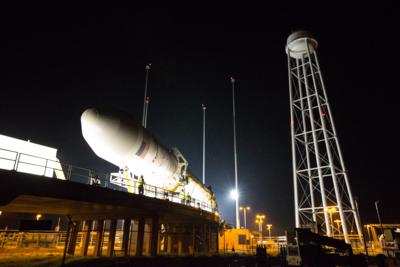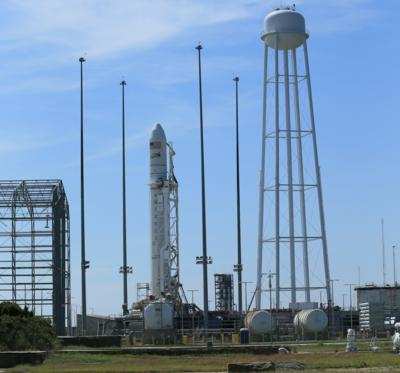Sun, Sep 15, 2013
Cygnus To Be First Spacecraft Launched To The Orbiting Laboratory From Virginia
Orbital Sciences Corp. of Dulles, Va., will postpone by at least 24 hours the launch of its Antares rocket and Cygnus spacecraft on a demonstration mission to the International Space Station from NASA's Wallops Flight Facility in eastern Virginia.

The new launch window is targeted for Wednesday, Sept. 18 between 10:50 to 11:05 a.m. EDT from the Mid-Atlantic Regional Spaceport Pad-0A at Wallops. Rendezvous with the space station remains scheduled for Sunday, Sept. 22.
The postponement is due to a combination of Friday’s poor weather, which delayed roll-out of Antares to the launch pad, and a technical issue identified during a combined systems test held Friday night involving communications between ground equipment and the rocket’s flight computer. The problem has been identified and corrected. The teams are working to understand why the problem occurred.
The company's Cygnus cargo carrier will be the first spacecraft launched to the orbiting laboratory from Virginia. The spacecraft will deliver about 1,300 pounds (589 kilograms) of cargo, including food and clothing, to the Expedition 37 crew aboard the space station. Future flights of Cygnus will significantly increase NASA's ability to deliver new science investigations to the nation's only laboratory in microgravity.

Orbital is the second of NASA’s two partners taking part in the agency's COTS program. The goal of this program is to develop safe, reliable, and cost effective cargo transportation systems. Orbital began its work in 2008. Following a successful demonstration mission, the company is poised to begin regular resupply missions. The other partner, Space Exploration Technologies (SpaceX), began its work in 2006, and after a successful test flight in 2012, began flying regular cargo missions to the space station.
During Cygnus' flight to the station, several of the spacecraft's systems and capabilities will be tested. After the space station flight control team has verified the results of these objectives, the spacecraft will be cleared to approach the station several days after launch. Cygnus will undergo more tests and maneuvers and ultimately will arrive beneath the outpost, where astronauts on board will use the station’s arm to capture the craft. They then will install it on the bottom side of the station’s Harmony module.

More News
Also: B-29 Superfortress Reunion, FAA Wants Controllers, Spirit Airlines Pulls Back, Gogo Galileo Van's Aircraft posted a short video recapping the goings-on around their reorganiz>[...]
Light Gun A handheld directional light signaling device which emits a brilliant narrow beam of white, green, or red light as selected by the tower controller. The color and type of>[...]
"The journey to this achievement started nearly a decade ago when a freshly commissioned Gentry, driven by a fascination with new technologies and a desire to contribute significan>[...]
"Our driven and innovative team of military and civilian Airmen delivers combat power daily, ensuring our nation is ready today and tomorrow." Source: General Duke Richardson, AFMC>[...]
Aircraft Conflict Predicted conflict, within EDST of two aircraft, or between aircraft and airspace. A Red alert is used for conflicts when the predicted minimum separation is 5 na>[...]
 Airborne 04.16.24: RV Update, Affordable Flying Expo, Diamond Lil
Airborne 04.16.24: RV Update, Affordable Flying Expo, Diamond Lil ANN's Daily Aero-Term (04.20.24): Light Gun
ANN's Daily Aero-Term (04.20.24): Light Gun Aero-News: Quote of the Day (04.20.24)
Aero-News: Quote of the Day (04.20.24) Aero-News: Quote of the Day (04.21.24)
Aero-News: Quote of the Day (04.21.24) ANN's Daily Aero-Term (04.21.24): Aircraft Conflict
ANN's Daily Aero-Term (04.21.24): Aircraft Conflict





